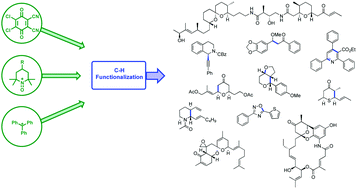Synthetic applications of hydride abstraction reactions by organic oxidants
Abstract
Carbon–hydrogen bond functionalizations provide an attractive method for streamlining organic synthesis, and many strategies have been developed for conducting these transformations. Hydride-abstracting reactions have emerged as extremely effective methods for oxidative bond-forming processes due to their mild reaction conditions and high chemoselectivity. This review will predominantly focus on the mechanism, reaction development, natural product synthesis applications, approaches to catalysis, and use in enantioselective processes for hydride abstractions by quinone, oxoammonium ion, and carbocation oxidants. These are the most commonly employed hydride-abstracting agents, but recent efforts illustrate the potential for weaker ketone and triaryl borane oxidants, which will be covered at the end of the review.



 Please wait while we load your content...
Please wait while we load your content...